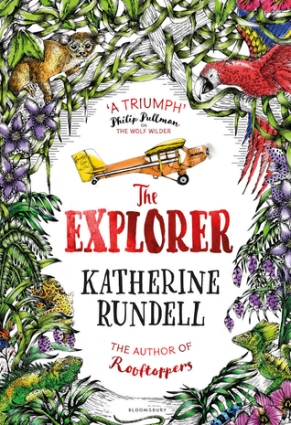 Author(s): Katherine Rundell
Author(s): Katherine Rundell
Publisher: Bloomsbury
Publication date: 10th August 2017
Category: children’s
Genre(s): adventure, historical fiction
Source: I received an e-copy of this book in exchange for an honest review. Quotes from this copy may be subject to final changes.
Find on Goodreads and The Book Depository
From his seat in a tiny aeroplane, Fred can see the vast Amazon jungle below him. He has always dreamed of becoming an explorer, of making history and reading his name on lists of great discoveries.
But when the plane crashes through the canopy, Fred suddenly finds himself in the jungle far sooner than he expected, along with three other children he’s only just met: Con, Lila and Max. With little hope of rescue, their chances of getting home feel impossibly small. Except, it seems, that someone has been there before them…
I love YA, but when you spend a lot of time reading and reviewing it (and its seemingly never-ending swamp of contemporary fiction), it can be a real breather to jump back into the exuberant capers and imaginative gymnastics of children’s fiction. There is a touch of that vibrancy to the work of Katherine Rundell, whose books include Rooftoppers (“A soaring story of adventure, friendship and hope set on the rooftops of Paris,” to use the fabulous Jenny’s words) and The Wolf Wilder, one of the most reviewed children’s titles of 2015. Set in the wilds of the Amazon rainforest and following four children who must work together to find their way back home, there’s no other term for it: The Explorer is a good old-fashioned adventure story.
Fred has read everything he can get his hands on about explorers and adventurers. But with his father far too busy working and being respectable to notice (“his father always insisted so unswervingly on clean shoes and unrebellious eyebrows”), Fred’s dreams have always been a secret. That is, until a trip to Brazil sees him crashlanded in the jungle with three other children – siblings Lila and Max, and haughty Con (actually Constantia but use it at your peril). While their time in the jungle is dangerous (and involves eating spiders), it opens up something more in each of them. Fred gets braver. Con learns to climb trees and run. Lila’s love for animals, though she’s never been allowed a pet, leads her to a sloth named Baca. Five-year-old Max mostly wanders off into nearby trees/beehives/ant nests, but you get the idea. There’s lots of teamwork, arguing, and new friendship.
As with all good kids’ books, adult characters are a secondary consideration. There is one exception: the titular and nameless explorer, a mysterious and gruff jungle-dweller who lives in some ancient ruins and can catch fish with his bare hands (think Indiana Jones if he was more concerned with leaving things intact than putting them in a museum). Rundell gives each of her characters moments of complexity or backstory, the explorer included. The period setting isn’t entirely specific, but a little digging puts it somewhere in the mid-to-late 1920s. There were no illustrations in my early copy, which is a shame as they have the potential to really change or cement one’s experience of the book. It takes time to invest in the plot and a rushed ending is precipitated by a little too much dialogue, but the book runs at an otherwise jolly pace. It’s packed with incident, from hair-raising river rides to tricky rock climbs.
Rundell’s prose is straightforward, expressive (“his accent, Fred thought, belonged among good tailoring and fast motor cars”) and memorable (“I liked that it might be all right to believe in large and wild things”). The rainforest – “it was a thousand different colours; lime and emerald and moss and jade and a deep dark almost black green that made him think of sunken ships” – ultimately becomes a place more for savouring than escaping from. As Rundell invokes the host of extraordinary creatures who call it home, sloths, snakes, spiders, monkeys, Amazon river dolphins, and whispers of big cats (“something with strong jaws and sharp manners”) all get a look in.
The writing style will appeal to readers across the 7-12 age group, and could make a great family/parent-child choice for reading aloud or together. The writing is by turns clever, challenging, touching (“Love is so terrifying. It is less like rainbows and butterflies and more like jumping on to the back of a moving dragon”), and tongue-in-cheek (“I did not admire our prime minister. He is very well-dressed, but despite his many protestations to the contrary, I am not one hundred percent sure he can read”). Of course it requires a little suspension of disbelief, a little strategic pacing, but for young readers that’s not going to detract too much from the story here. The Explorer is about adventures, and wildlife, and kids who get their hands dirty.

Vibrant, expressive and often clever, The Explorer is a good old-fashioned adventure story. Rundell’s prose is terrifically appealing. Ideal for young fans of Kiran Millwood Hargrave’s The Island at the End of Everything or Abi Elphinstone’s The Dreamsnatcher.

